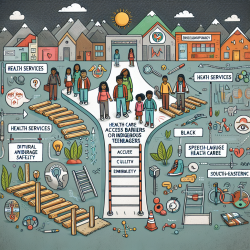Introduction
In the wake of the COVID-19 pandemic and ongoing racial injustices, the need for accessible mental health care has become more pressing than ever. The research article titled "Adapting behavioral activation for perinatal depression and anxiety in response to the COVID-19 pandemic and racial injustice" offers valuable insights into how practitioners can adapt their therapeutic approaches to better serve perinatal women experiencing depression and anxiety. This blog will explore the key findings of the study and provide practical guidance for practitioners looking to enhance their skills in delivering behavioral activation (BA) therapy.
Understanding Behavioral Activation
Behavioral Activation (BA) is a therapeutic approach that focuses on increasing engagement in enjoyable or fulfilling activities that align with a person's values. This approach is particularly effective in reducing depression and anxiety by targeting avoidant coping mechanisms and fostering a sense of agency and well-being.
Key Findings from the Research
The study conducted a rigorous qualitative analysis involving perinatal participants and treatment providers to identify barriers and facilitators in delivering BA during the pandemic. Here are some key findings:
- Facilitators for Participants: Participants reported that BA provided essential social connection and support during the pandemic. Creative problem-solving and managing pandemic-related symptoms were also highlighted as significant benefits.
- Facilitators for Providers: The use of telemedicine emerged as a crucial facilitator, allowing for flexibility and continued treatment delivery despite restrictions on in-person care.
- Barriers: Both participants and providers faced challenges such as privacy issues, work/family interruptions, and pandemic-induced stressors. Limited activities due to COVID-19 restrictions also posed a barrier to engaging in mood-enhancing activities.
Practical Implications for Practitioners
For practitioners, the study underscores the importance of adapting BA to the unique challenges posed by the pandemic and racial injustices. Here are some practical steps to consider:
- Embrace Teletherapy: Utilize telemedicine platforms to offer flexible and accessible therapy sessions, ensuring continuity of care.
- Focus on Creative Problem-Solving: Collaborate with clients to identify values-based activities that are feasible within current restrictions, fostering a sense of purpose and connection.
- Address Racial Injustice: Engage in open discussions about race and racial injustice during therapy sessions to strengthen the therapeutic alliance and address clients' concerns.
Encouraging Further Research
While the study provides valuable insights, there is a need for further research to explore how BA can be delivered in a culturally sensitive manner and address the unique challenges faced by ethnically diverse populations. Practitioners are encouraged to engage in ongoing research and training to enhance their understanding and application of BA in diverse contexts.
To read the original research paper, please follow this link: Adapting behavioral activation for perinatal depression and anxiety in response to the COVID-19 pandemic and racial injustice.










